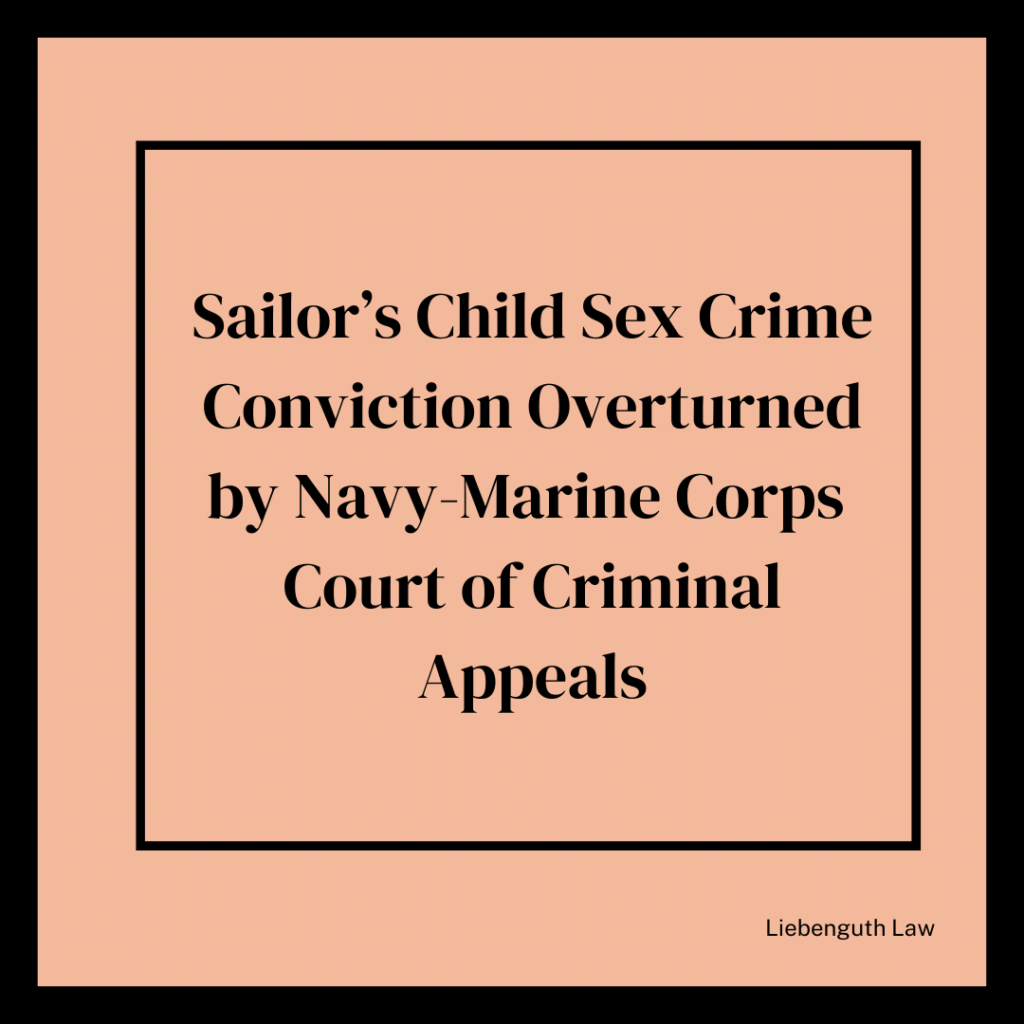
Sailor’s Child Sex Crime Conviction Overturned by Navy-Marine Corps Court of Criminal Appeals
In a published opinion in United States v. Pyron (opinion available here), the Navy-Marine Corps Court of Criminal Appeals set aside the conviction and 39-year sentence of a Navy Sailor who was found guilty of two specifications of attempted rape of a child, one specification of rape of a child, and four specifications of sexual abuse of a child.
Disclaimer: I drafted the defense written appeal brief in this case and worked on the oral argument preparation.
On appeal, the Sailor’s appellate military defense team asserted that the military judge erred in denying a defense challenge for cause of one of the jury members. At the heart of the issue was the individual voir dire (questioning) of the subject jury member, which the appeals court substantially characterized in this way:
“The military defense attorney asked LT Alpha whether he thought of his daughters, ages 8 and 11, when he read the charges on the charge sheet. LT Alpha answered yes, and when the defense attorney asked LT Alpha ‘[i] n what capacity” he thought of his daughters, LT Alpha responded ‘Not in a good way, personally.’ The military defense attorney then asked his final question, ‘Do you think as you hear the evidence you’re gonna think about your girls, maybe, when you see the witnesses come in and testify?’ LT Alpha responded “It would be hard not to.” The defense counsel had no further questions for LT Alpha. There were no questions from either the trial counsel or the military judge.”
The defense challenged LT Alpha, arguing that he should not sit in judgment of the accused because of implied bias. During argument on the matter, the military judge asked the prosecutor to respond to LT Alpha’s statement that it would be hard not to think of his own daughters when hearing evidence, to which the prosecutor responded:
“I think, again, it’s hard for anybody not to think of the children in their lives when it comes to these charges. Specifically with respect to [LT Alpha], he was also very clear that he can leave that outside; that it won’t color the way that he looks at this case. That he’ll evaluate it based on the—the facts and the—the facts and the circumstances at issue. . . . If you look at the totality of his responses to the answers, he was very clear that he can leave it outside.”
The military judge agreed, and the defense challenge of LT Alpha for implied bias was denied. LT Alpha therefore remained on the court-martial panel that found the accused guilty and sentenced him to 39 years in prison.
In setting aside the sentence and the 39-year conviction, the appeals court stressed, among other things, that contrary to the prosecutor’s claim, LT Alpha never indicated that he could hear the evidence in the case without thinking of his daughters, both of whom were close in age to the alleged child victims:
“[T]he issue arose when LT Alpha stated in individual voir dire that he not only thought about his daughters when he reviewed the charge sheet prior to voir dire, but did so in ‘not a good way.’ He further stated that ‘it would be hard not to’ think about his daughters when witnesses testified throughout the trial. Remarkably, . . . neither trial counsel nor the military judge asked any further questions of LT Alpha. It is possible that LT Alpha’s comments could have been reconciled in a way that rehabilitated him as an unbiased member. However, neither the trial counsel nor the military judge attempted to rehabilitate him. Nor did the military judge or the parties provide LT Alpha a warning that he must disregard any feelings concerning his own daughters when conducting his deliberations and voting on findings and sentence. Most importantly, because he was not asked a single rehabilitative question, the public is left with the impression that every time a witness testified, LT Alpha would be thinking of his own daughters ‘not in a good way,’ not only because he told counsel it would be hard not to, but because he was never instructed by the military judge not to do so.”
“Contrary to the trial counsel’s claim, there was no clarification of LT Alpha’s responses, much less anything to suggest he was ‘very clear that he could leave it outside,’ or that it ‘won’t color the way that he looks at the case.’ As LT Alpha was never asked those questions, the record is absent of any evidence to support that what the trial counsel was arguing was, in fact, true.”
With the convictions and the 39-year prison sentence wiped away, this is a huge win for the defense and Pyron.
To learn more about Jeff Liebenguth’s military appeals practice and experience, visit https://liebenguthlaw.com/appeals/
